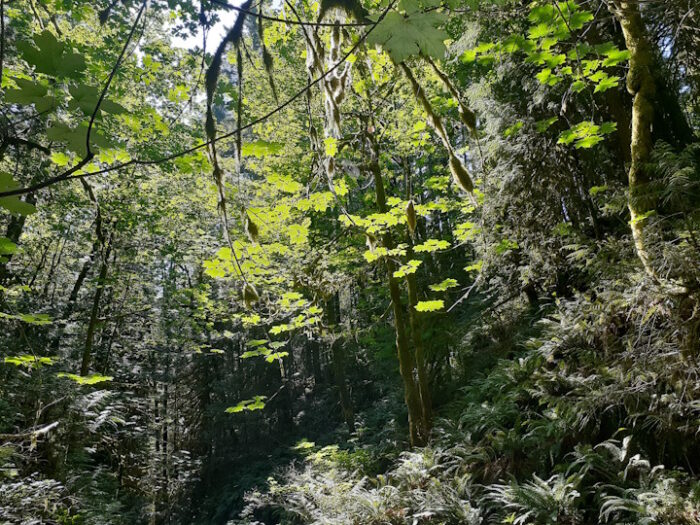All loves are bodily. I read these words
and they strike within, a deep note of truth.
Something entirely comprehensible, when, as a child
I ran through green willows, heard music,
and knew the world was built for happiness.
And now, too, as one aging into life’s narrowness,
I move through slants of light, from dawn to twilight,
and feel: the closer to death, the more I love this earth.
This earth, where each thing stands for nothing
but its own wondrous and inexplicable existence,
yet is wind-pierced and wave-washed by a Presence.
Like the sand and crushed shells beneath my back.
Like the keening call of an eagle, atop a hemlock.
All animal, all spirit, all holy.


I loved the fitness of the photo to your poem. There is eternity in the slants of light through trees that always catches my breath. Being in the same age bracket as you, I also recognized that feeling in “the closer to death, the more I love this earth.” But I paused over the lines ” This earth, where each thing stands for nothing / but its own wondrous and inexplicable existence.” In my mind, each thing can be symbol-rich and stand for more than itself. Perhaps what I sense is that the more each thing is itself, the more it is connected to all else. Hence there is always a need for more poems!
Thank you, Edna, for your truly thoughtful response. And of course, you are right about each thing being “symbol-rich,” being more than itself. And so the next line contains the “wave-washed ‘Presence’.” What I didn’t want to do is skip quickly from the bodily to the ethereal, to the spiritual, and pass over the ‘thing’ itself. Instead, to appreciate, be amazed, by the wonder of the existence of each and everything, yes, as a means to “see” the creator, but not merely as a means to an end. More, to love the ‘material’ thing itself, to care about it, and take care of it, which should lead us to better stewardship and greater compassion than what our history has shown.
I agree completely, especially about the need to work toward “better stewardship and greater compassion.” I had already hit “send” on my comment before I remembered Gerard Manley Hopkins’ ” As Kingfishers Catch Fire” in which he declares that “each mortal thing . . . goes itself; ‘myself’ it speaks and spells, / Crying ‘What I do is me: for that I came.” Your poem brings that concept forward into our time and with more accessible language. Thanks again for sharing your heart through poetry.
Thank you for that, Edna! And I love that Hopkins’ poem.
Thank you Stephen, for this pause to consider Creation, it’s beauty and my perception of it. How I can always turn to nature, my church, to experience wonder.
Thank you, Kirk. Yes, isn’t it true that the more immersed we are in the wondrous stuff of the earth, the closer we feel, the closer we are, to the Creator.
So beautiful. So relatable.
Thank you, kind, Michelle!
I love the idea you touch on – as we get closer to returning to dust ourselves we develop an affinity to the dust under our feet – the places we might be planted. I think it is a choice though that sadly not everyone will make – to love the world better.
Thank you for enriching the world with your words.
Thank you so much for this, Sue.